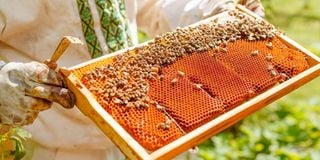Premium
Bee farmers oppose proposed law, term it 'sabotage'

A farmer harvests honey. Farmers will be restricted from keeping bees for commercial purposes if the National Assembly passes a new livestock Bill.
Local leaders and beekeepers in Baringo County have protested the proposed Livestock Bill, 2021 that seeks to restrict farmers from keeping bees for commercial purposes.
The bill has caused uproar among residents of arid areas, who described the move as sabotage by unscrupulous cartels.
The proposed law, drafted by National Assembly Majority Leader Amos Kimunya, only allows apiaries (bee yards) registered by the government.
The farmers, led by Justin Chebii, who is also the chairman of Baringo Bee Keepers and Honey Producers Association, said that if the bill is signed into law, it will deal a big blow to farmers in the arid and semi-arid areas who mostly rely on beekeeping as an economic activity.
Shocker to bee farmers
“The proposed bill has come as a shocker to bee farmers. Why impose bureaucracies on people in arid areas who depend on honey as a main source of livelihood? Locals in the banditry-prone areas in Baringo County who were turned paupers after all their livestock were wiped out by armed criminals had resorted to beekeeping as an alternative way of livelihood,” he said.
“We are wondering what interests the proponents of the livestock bill have by pushing for such laws that would sabotage farmers unless they tell us they are working with unscrupulous cartels to kill our business. We are not going to sit and watch as some individuals craft our downfall,” he added.
Charity Ng’eno, a farmer in Baringo South, claimed that most parts of the region are not viable for agriculture and beekeeping has been the economic mainstay for thousands of locals.
“We cannot plant crops in the arid areas because of the unfavourable climatic conditions. We have depended on honey for our basic needs and paying school fees for our children since time immemorial and those leaders who want to sneak draconian laws are enemies of farmers because, instead of rooting for regulations that can uplift our living stands, they want to kill our business completely,” she said.
Shoot down bill
Mogotio MP Daniel Tuitoek and Baringo South’s Charles Kamuren have vowed to rally behind their counterparts in Parliament to shoot down the proposed bill.
“We are not going to support regulations that are [meant] to cripple farmers who are struggling to earn a living. Those who drafted the bill are just busybodies and we will shoot it down,” he said.
Labour and Social Services Cabinet Secretary Simon Chelugui said the proposed law should not raise jitters because Kenyans will be given an opportunity, through public participation, to air their views on it.
Speaking on Sunday during a fundraiser at Emining Full Gospel Church in Mogotio Sub-County, Mr Chelugui said the government is keen on inspiring farmers and not sabotaging them.
“Bills are supposed to encourage and inspire farming and we are sensitive to any issue touching the common mwananchi by ensuring that the feelings and interests of Kenyans are enshrined in all our views,” he said.
Commercial purposes
The proposed livestock bill states that a person shall not own or possess bees or beekeeping equipment for commercial purposes unless he or she is registered under the Act to allow bees to be kept on land owned by an individual.
The proposed law requires those wishing to be registered as beekeepers to apply to the county executive in charge of livestock and the certificate of registration will be valid for a period of one year from the date of issue.
Most parts of Baringo County are dry, dominated by shrubs, an ideal habitat for bees. The region generates more than 10,000 tonnes of honey annually.
Baringo Governor Stanley Kiptis has been encouraging farmers to move from traditional beekeeping to commercial ventures.
“Baringo honey cannot be rivalled in any part of the country and we want to profile it to get its rightful place. We are projecting at marketing our honey products both locally and internationally and if fully exploited, the sector can go a long way in alleviating the effects of perennial drought,” he said.
He cited other leading honey producers in Africa, such as Ethiopia, Zambia, Tanzania, Uganda and Zimbabwe, which he said have the same favourable climatic conditions for beekeeping just like Baringo.





